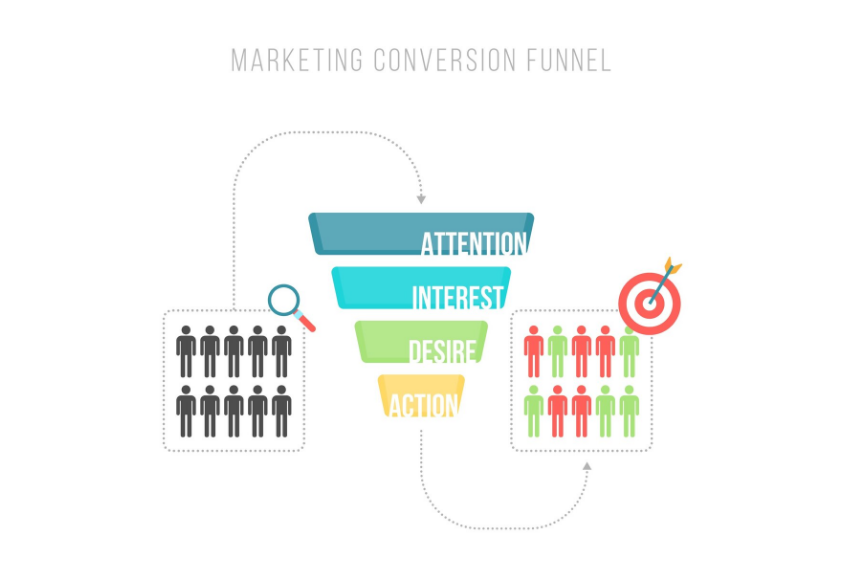Funnels are a central aspect of marketing, sales, and business development strategies. Whether you are selling a product, getting leads, or building relationships, knowledge of the types of funnels assists in moving your audience from awareness to action.
Here, we will simplify the primary types of funnels, describe their processes, and give real-life examples for each.
What is a Funnel in Business?
A funnel is the process-driven journey a customer makes prior to accomplishing a wanted action — like buying a product, subscribing to a newsletter, or scheduling a consultation. It’s a funnel because lots of individuals get in at the top, however few make a move at the bottom.
Main Types of Funnels Explained with Examples
Following are the most popular kinds of funnels and their respective business purposes.
- Sales Funnel
Purpose: Convert cold leads into paying customers.
Stages:
Awareness: Social ads, blog posts, SEO.
Interest: Landing pages, email sequences, lead magnets.
Decision: Webinars, case studies, product comparisons.
Action: Checkout page, payment gateway.
Example:
A fashion brand places Facebook ads (Awareness), provides a 10% discount upon email sign-up (Interest), provides product recommendations (Decision), and funnels customers to a clean checkout page (Action).
- Lead Generation Funnel
Purpose: To gather leads (emails or contact information) for subsequent marketing.
Stages:
Attract: No-cost valuable content (e.g., eBooks, quizzes).
Capture: Lead form or opt-in page.
Convert: Follow-up emails or calls.
Example
A digital agency provides a free “Social Media Strategy Checklist” on their website. Visitors provide their email addresses to download it. The agency subsequently offers a free consultation.
- Webinar Funnel
Purpose: To sell high-priced products or services via live or automated webinars.
Stages:
Registration Page
Thank You Page
Email Reminders
Live/Automated Webinar
Call-to-Action or Offer Page
Example:
A business coach invites individuals to a complimentary webinar: “How to Scale Your Coaching Business in 60 Days.” Following the session, participants are presented with a $997 course.
- Product Launch Funnel
Purpose: To create excitement and anticipation for a new product.
Stages:
Pre-Launch Content: Teasers, emails, social proof.
Launch Emails: Urgency-based announcements.
Sales Page: Limited-time offer or bonuses.
Example:
A SaaS startup creates buzz with teaser clips, then leaves the cart open for 5 days with an early-bird discount. They employ scarcity to drive conversions.
- Tripwire Funnel
Goal: To turn leads into customers by providing a low-priced product.
Steps:
Lead Magnet
Tripwire Offer (Low-Ticket)
Upsell/Downsell
Main Offer
Example:
A dietitian provides a free meal plan guide. Once signed up, users are shown a $7 “30-Day Recipe Book.” Once bought, they’re presented with a $97 video course on healthy living.
- Email Funnel
Purpose: To lead and convert prospects over time via email sequences.
Stages:
Welcome Email
Value Emails (Tips, Stories)
Offer Emails
Follow-ups/Cart Abandonment
Example:
An online course site sends a 5-email sequence when someone downloads a free course outline. The 3rd email features a time-limited 20% discount on the course.
- Affiliate Funnel
Purpose: To sell third-party products and receive commissions.
Stages:
Content Attraction (Blog, YouTube, Ads)
Click to Bridge Page or Affiliate Link
Redirect to Sales Page
Earn Commission on Sale
Example
A technology blogger publishes a review of a hosting site. They add an affiliate link. When users click and buy, the blogger receives a commission.
- Application Funnel
Use: For high-touch services such as coaching, consulting, or B2B selling.
Steps:
Qualifying Page or Quiz
Application Form
Schedule a Call
Sales Call or Strategy Session
Example
A business coach employs a quiz to prequalify clients. Ideal prospects are invited to apply and schedule a strategy call. Only serious prospects proceed.
Last suggestion
Funnels aren’t mere tools — they’re complete strategies that facilitate automated growth, conversion boosts, and trust establishment with your audience. Your choice of funnel relies on your business model, product category, and customer journey.

